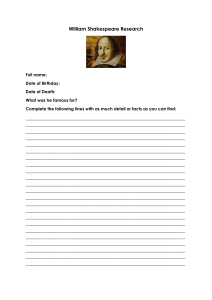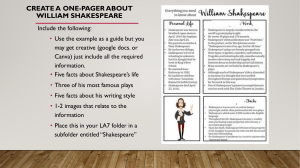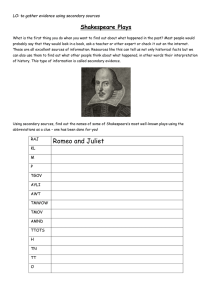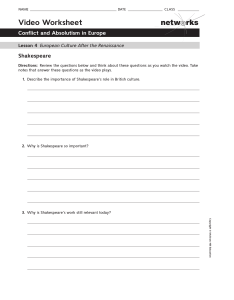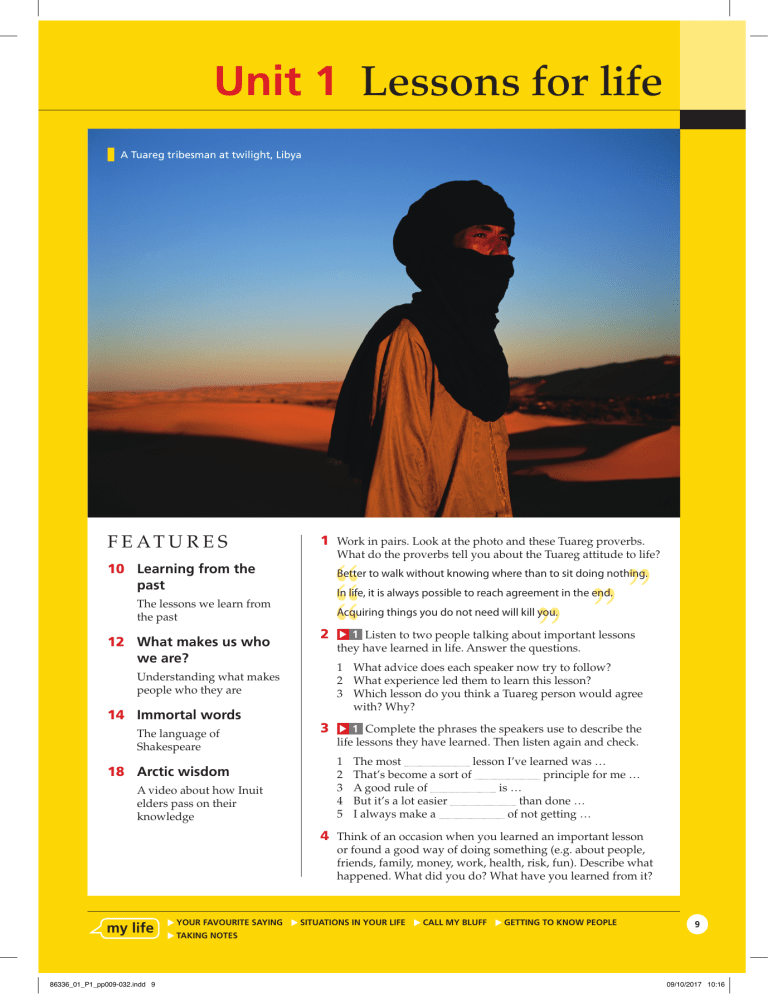
Unit 1 Lessons for life A Tuareg tribesman at twilight, Libya F E AT U R E S 1 Work in pairs. Look at the photo and these Tuareg proverbs. What do the proverbs tell you about the Tuareg attitude to life? 10 Learning from the past Better to walk without knowing where than to sit doing nothing. In life, it is always possible to reach agreement in the end. The lessons we learn from the past 12 What makes us who we are? Acquiring things you do not need will kill you. 2 1 What advice does each speaker now try to follow? 2 What experience led them to learn this lesson? 3 Which lesson do you think a Tuareg person would agree with? Why? Understanding what makes people who they are 14 Immortal words The language of Shakespeare 18 Arctic wisdom A video about how Inuit elders pass on their knowledge 1 Listen to two people talking about important lessons they have learned in life. Answer the questions. 3 1 Complete the phrases the speakers use to describe the life lessons they have learned. Then listen again and check. 1 2 3 4 5 lesson I’ve learned was … The most That’s become a sort of principle for me … A good rule of is … But it’s a lot easier than done … I always make a of not getting … 4 Think of an occasion when you learned an important lesson or found a good way of doing something (e.g. about people, friends, family, money, work, health, risk, fun). Describe what happened. What did you do? What have you learned from it? my life 86336_01_P1_pp009-032.indd 9 YOUR FAVOURITE SAYING SITUATIONS IN YOUR LIFE CALL MY BLUFF GETTING TO KNOW PEOPLE 9 TAKING NOTES 09/10/2017 10:16 reading lessons in life • grammar time phrases • speaking your favourite saying 1a Learning from the past Reading 3 Read the article again. According to the article, are the sentences true (T) or false (F)? 1 Work in pairs. Read the quotation. 1 Sometimes people don’t want to follow the lessons of the past. 2 A lot of Chinese people feel that their society is not interested in the past. 3 China’s rapid development has begun to slow down. 4 Mandela was not opposed to violence in principle. 5 Nelson Mandela wanted the two sides in South Africa to forget what had happened in the past. 6 The writer suggests that most people are too selfish. Do you think this is good advice? Is it easy to follow? Discuss with your partner. Learn from the mistakes of others. You can’t live long enough to make them all yourself. Eleanor Roosevelt, Diplomat 2 Read the article. Match the person (1–2) with the type of lesson they taught (a–c). There is one extra type of lesson. 1 Confucius 2 Nelson Mandela 4 Find words or expressions in the article with these meanings. a a lesson that is difficult to follow b a lesson that has been misinterpreted c a lesson that has been forgotten 2 1 2 3 4 5 L E A R N I N G F R O M T H E P A S T Why do we never seem to learn from the past? The mistakes or correct actions of others should point the way for us in the future. But either we forget these lessons or we fail to follow them or, in some cases, we deliberately choose to ignore them. Of all the lessons that we have to learn, perhaps the most difficult is how not to be selfish or think only of ourselves. In China, the government is trying to remind people of the lessons given by Confucius, the ancient philosopher. Because of China’s economic boom in recent years, the ‘Consideration for others is the basis of a good life, a good society.’ Confucius ‘If you want to make peace with your enemy, you have to work with your enemy.’ Nelson Mandela show the right direction (para 1) period of significant growth (para 2) do something as a result of information or advice (para 3) work hard towards a goal (para 4) copy someone’s behaviour (para 4) government has become worried that people are becoming more selfish and individualistic. Many Chinese have been saying for some time that the traditional values in society of harmony, respect and hard work have been lost. Accordingly, a few years ago the government focused attention again on the teachings of Confucius. Prior to the 1990s, Confucianism had not been fashionable, but in a country which is currently developing at a dizzying speed, his teachings offer a sense of stability and order. Nowadays, people often talk about Confucius’ idea of a ‘harmonious society’, even if they do not always act on it. Sometimes it is difficult to learn lessons because the standards of the ‘teacher’ are so high. This is certainly the case with Nelson Mandela, who tried to spread the message of reconciliation to two sides in South Africa who hated and distrusted each other deeply. Mandela had always been committed to peace, and while he was living in prison, he decided that the only way to unite his divided country was if the two sides could talk about what had happened in the past and begin to rebuild some measure of trust. All those who strive for peace know that in the long term they will have to begin a dialogue with their enemy. Yet few are able to follow the example set by Mandela, because it requires such a high degree of unselfishness. It seems that heeding this warning – not to be selfish – is perhaps the hardest lesson of all for people to learn. dizzying (adj) /ˈdɪziɪŋ/ very fast and confusing reconciliation (n) /ˌrek(ə)nsɪlɪˈeɪʃ(ə)n/ making peace and re-establishing relations 10 86336_01_P1_pp009-032.indd 10 09/10/2017 10:16 Unit 1 Lessons for life Grammar time phrases 7 Complete the conversations with the correct form of the verbs. Use the time phrases to help you decide which form to use. TIME PHRASES Certain time phrases are commonly (but not always) used with certain tenses. Present simple: often, never, every week, generally Present continuous: now, at the moment, this week Past simple: two days ago, last week, at the time, when Past continuous: at the time Present perfect simple: just, recently, so far, over the last two years, how long, for, since (2010), already, yet, ever, never Present perfect continuous: how long, for, just, recently, since Past perfect simple and continuous: already, before that, up to then will, going to and present continuous for future: next week, in three days / in three days’ time, soon, on Friday For further information and practice, see page 156. 5 Look at the grammar box and the time phrases (1–8) below. Then follow the steps (a–b). 1 2 3 4 in recent years for some time a few years ago prior to the 1990s 5 6 7 8 currently nowadays while in the long term a Find the verbs that are used in the article with each of the time phrases and identify the tenses. b Match the time phrases (1–8) with the tense in the grammar box. 6 Complete the sentences with these time phrases. at the moment at the time before that ever fifty years ago for years in the coming years nowadays often over the last 25 years military service was compulsory in the UK. But 2 young people don’t have to go into the army. I think this will change 3 because there is a feeling that young people need more discipline. b 4 , people have definitely become more greedy. I’ve been saying 5 that it is not right for anyone to earn a hundred times the average salary. c I’m having an interesting debate with my father 6 . He says that young people don’t 7 show respect to their elders anymore. But I don’t think you can just demand respect; you have to earn it. d When I was forty, I decided to stop working so hard. 8 , I was working sixty hours a week. It was the best decision that I have 9 made. 10 , I had had no time to enjoy life. a 1 my life 86336_01_P1_pp009-032.indd 11 YOUR FAVOURITE SAYING (you / learn) 1 A:How long Japanese? You speak it really well. B:Thanks! I (start) having lessons two years ago. But I (learn) a few words on a trip to Japan before that. 2 C: (you / try) out the new gym yet? I (go) last night. It’s great. D:No. Every week I (tell) myself I’m going to go, but I never (seem) to make it. I’m sure I (get) there in the end, though. 3 E:What (you / work) on currently? F:Well, for the last two weeks I (do) some work at the university computing department. E:Oh, that explains it. I (see) you outside the university building the other day. 8 Complete the sentences by writing facts about yourself. Write one sentence which is not true. Then work in pairs. Compare sentences with your partner and try to guess the false sentence. 1 My work? Currently, I … Currently, I’m looking for a new job. 2 I like seeing new places. A few years ago, I … 3 In my free time, I usually … 4 I have never … , but I’ve always wanted to. 5 I didn’t … last weekend, because I had already … 6 I met my best friend when I … . I … at the time. 7 I … for several years. 8 I don’t have the time or money at the moment, but sooner or later I … 9 Complete the advice about life using these words. Then compare answers with your partner. Which piece of advice do you like most? Why? ever for in never now while you are making 1 Life is what happens other plans. 2 Value your friends. If you ignore them a long time, they will start to ignore you. 3 When you’re feeling stressed, ask yourself this question: five years, will the problem still seem so important? 4 No one has become poor by giving. 5 Get out more. A whole world of amazing experiences is waiting for you right . 6 You should take yourself too seriously. Speaking my life 10 Work in groups. Each write down two of your favourite (or least favourite!) sayings about life. Then discuss your choices. SITUATIONS IN YOUR LIFE CALL MY BLUFF GETTING TO KNOW PEOPLE 11 TAKING NOTES 09/10/2017 10:16 vocabulary and listening personality and identity • wordbuilding binomial pairs • pronunciation linking in word pairs • grammar the continuous aspect • speaking situations in your life 1b What makes us who we are? A Paris painter next to his self-portrait Vocabulary and listening personality and identity 3 Look at these factors which can give people information about you. Which do you think are the most significant? Number them in order (1–8) of importance. 1 Work in pairs. Look at the photo and a b c d caption. Discuss the questions. 1 Why is the painter putting his hands up? 2 What impression of the painter do you get from his self-portrait? a control freak a dreamer a driven person a family person a free spirit a joker the life and soul of the party an outgoing type 1 What do you think each expression means? 2 Which expressions do you think are positive, negative or neutral? 3 Give an example of someone you know who fits each description. e f g h your life experiences your interests/hobbies your background your beliefs and values 4 3 Listen to a sociologist describing how we define ourselves. Tick (✓) the factors in Exercise 3 that he mentions. Which is the most important, according to him? 5 3 Listen to the talk again. Choose the correct option to complete the sentences. 2 Look at the expressions to describe people. Answer the questions. your friends your work your age your character 1 The speaker thinks the question ‘What do you do?’ can sound aggressive / judgmental as a conversation starter. 2 Sally has been defined by her background because she didn’t grow up in the city / a normal family. 3 Sarah has dedicated her life to helping people who are ill / live in poor countries. 4 The most important thing for John about his work is the challenge / security. 5 Jack hasn’t been in a relationship since he was 34 / 25. 6 Anne wants school children to eat better / more vegetarian food. 12 86336_01_P1_pp009-032.indd 12 09/10/2017 10:16 Unit 1 Lessons for life Wordbuilding binomial pairs WORDBUILDING binomial pairs Certain pairs of words in English are irreversible, i.e. they always appear in the same order. rock and roll (never roll and rock), law and order For further practice, see Workbook page 7 and 11. 6 Look at the wordbuilding box. Choose the correct form of these irreversible word pairs (a–b). a He picks up pieces and bits / bits and pieces of work as and when / when and as he can. b It seems that what defines people first and foremost / foremost and first is experience. 7 Complete the word pairs using these words. Discuss what you think each phrase means. fro games large pains quiet sound sweet then wide to concentrate. 1 I need peace and 2 They all came back from their canoeing trip safe and . No one was injured, but most of them had a few aches and . 3 Try not to give a long talk. By and , it’s better to keep it short and . 4 People come from far and to see Stonehenge. There are busloads of tourists coming to and all day. 5 You think my job is all fun and , but actually now and we do some serious work too! 8 Pronunciation linking in word pairs 4 Listen to the word pairs in Exercise 7. Notice a) how the words are linked and b) the pronunciation of and in the word pairs. Then practise reading the sentences. Grammar the continuous aspect THE CONTINUOUS ASPECT Present continuous 1 … you feel as if people are always judging you … 2 It’s now becoming a national movement. Present perfect continuous 3 He has been saying that since he was 35. Past perfect continuous 5 At one point, he had been intending to leave the company … Future continuous 6 In a few years, he won’t be moving about anymore. For further information and practice, see page 156. 86336_01_P1_pp009-032.indd 13 YOUR FAVOURITE SAYING bold describes something which: a b c d is a current trend? we expect to be happening (now or) in the future? started in the past and is still continuing? is the background to another more important event in the past? e was in progress up to a point in the past? f happens regularly and is irritating? 10 Work in pairs. What is the difference in meaning, if any, between these verb forms? 1 What do you do / are you doing? 2 My husband is always phoning / always phones me at work. 3 I’ve been reading / I’ve read the book you gave me. 4 When I left school, I was working / worked at a restaurant at weekends. 5 This time next week, I’ll be sitting / I’ll sit on a beach in the Bahamas. 6 He had been working / had worked as a nurse before he became a paramedic. 7 She was living / had been living / lived in Germany before she moved to this country. 8 California is eight hours behind us. Anne-Marie will be going / usually goes to bed now. 11 Complete the sentences using the appropriate continuous form of the verbs. 1 Marlon’s a fantastic football player, isn’t he? (watch) him playing I the other day. I expect in a few years he (play) professionally. Apparently, some clubs (already / watch) him. 2 Katja is such a great friend. Last week I (feel) really fed up about work and she gave me some chocolates that she (save) for a special occasion. 3 Marta (get) very eccentric. She keeps budgerigars and recently she’s started letting them out of their cages; so they (fly) all over the house. I (sit) in her kitchen the other day and one flew down and landed on the table. Speaking my life 12 Think of examples of the following things. Then Past continuous 4 When his children were born, he was working as a carpet salesman. my life 9 Look at the grammar box. Which verb form in work in pairs and take turns to tell each other your ideas and ask follow-up questions. • a habit of other people that irritates you • two things that you imagine people you know will be doing right now • a situation that you hope is temporary • something you haven’t finished but keep meaning to • something you had been intending to do but then changed your mind SITUATIONS IN YOUR LIFE CALL MY BLUFF GETTING TO KNOW PEOPLE 13 TAKING NOTES 09/10/2017 10:16 reading the language of Shakespeare • critical thinking purpose • word focus life • speaking call my bluff 1c Immortal words Reading 1 Work in pairs. Discuss the questions. 1 Who are the most famous writers in your country’s history? What did they write? 2 What Shakespeare plays or characters can you name? What do you know about them? 2 Read the article. According to the author, why are Shakespeare’s plays still so popular today? 3 Read the article again and answer the questions. 1 What adjective describes what England was like in Shakespeare’s time? (para 1) 2 What new element did Shakespeare bring to play writing, according to Bloom? 3 Why does Hamlet find it difficult to make a decision? 4 In Romeo and Juliet, what is the nurse’s attitude to relationships? 5 Which adverb means that Shakespeare was good at expressing ideas in just a few words? (para 4) 6 What verb tells you that Shakespeare created new words and expressions? (para 4) 4 Look at the expressions in italics in paragraph 4. Use them to replace the words in bold below. 1 I need a new jacket. This one is past its best. 2 I’m 24. I have money and a university degree. I can do anything I want to. 3 He said that one of the shops in town would have the right battery, but it turned out to be a search for something that couldn’t be found. 4 What the critics say is not significant. What matters is whether the public like the film. 5 Everyone says it’s an obvious result that Johanna will win, but I’m not so certain. 6 There’s no point telling her he’s no good. You can’t see the faults in the person you love. 7 The teacher got us to play a game to help people relax at the start. 8 After six different jobs, I’m with my first company again. I’ve arrived back at the starting point. Critical thinking purpose 5 Which option(s) (a–d) describes the author’s main purpose for writing this article? Underline the sentences in the article that tell you this. a b c d to review Harold Bloom’s book to explain why Shakespeare is popular today to examine if Shakespeare’s reputation is justified to examine Shakespeare’s contribution to modern-day English 6 Did the author state her purpose at any point? In which of these writing types do you think it is important for an author to begin by stating the reason for writing? • a description • a job application • a business report • a personal letter 7 Do you think the author achieved her purpose? Why? / Why not? Word focus life 8 Look at the article again. Find words or expressions with the word life that mean: 1 realistic (para 2) 2 for all one’s life (para 2) 3 with a ‘big’ personality (para 3) 9 Work in pairs. Look at the expressions with life in bold. Discuss what they mean. 1 I sold my old Citroen 2CV car last year for £300. Now I’ve just read that they’ve become really valuable! That’s the story of my life. 2 Work stress is just a fact of life these days – you have to learn to deal with it. 3 There were people at the conference from all walks of life – writers, students, business people. 4 My son was worried about going to university, but now he’s having the time of his life. 5 Thanks for driving me to the station – it was a real life-saver. I’d have missed my train. 10 Work in groups. Each think of a personal example for two of the expressions in Exercises 8 and 9. Not doing well in exams has been the story of my life! Speaking my life 11 Work in two groups of three. Play the game Call my bluff using words coined by Shakespeare. Group A: Turn to page 153. Group B: Turn to page 154. • For each word, rewrite the true definition in your own words, then write two false definitions. Write example sentences for each definition. • Group A reads the three definitions of the first word. Group B must guess which is the true definition. • Group B then reads the definitions of their first word for Group A to guess the true one. • Then repeat this procedure with the other words. 12 Think of an aspect of your life. Choose a word related to this, and find the English word. Then play Call my bluff with that word. 14 86336_01_P1_pp009-032.indd 14 09/10/2017 10:16 Unit 1 Lessons for life 5 5 10 15 20 25 30 The sixteenth-century dramatist Ben Jonson generously called his rival, Shakespeare, a writer ‘not of an age, but for all time’. And so it has proved to be, because Shakespeare’s plays are still the most translated and most performed of any playwright’s in the world. But if you ask people the reason for Shakespeare’s continued popularity, you get different answers. Some say he was a great storyteller, others that the magic lies in the beauty of his poetry. Some say it is simply because he left us a huge volume of work, which was written during a vibrant time in English history, particularly in the theatre. A more interesting answer that I came across recently is one put forward by the critic Harold Bloom in his book Shakespeare: The Invention of the Human. Bloom argues that Shakespeare gave us something that the world had not seen in literature before – characters with personalities, and particularly weaknesses, that we could relate to. These lifelike characters and the observations that Shakespeare made about the human condition are really what Jonson was referring to when he talked about Shakespeare’s universal appeal. For Bloom, a lifelong fan of the poet, English speakers have Shakespeare to thank for much of their current language, cultural references and their understanding of human psychology. While some might disagree with Bloom’s assertion about the invention of ‘personality’ in literature – many earlier storytellers like Homer and Petrarch could claim this – there is no doubt that Shakespeare’s characters resonate with people very strongly. We sympathize with poor Hamlet because we all know that frustrating situation where our hearts tell us one thing must be true and our heads another. We laugh at the larger-than-life nurse in Romeo and Juliet because of the amusing way she offers advice to Juliet about relationships, putting practical considerations before romance; she is a person that we too have met. The name Lady Macbeth has become synonymous with cold, over-ambitious women; while the character of Iago still serves as a warning about the dangers of jealousy and how it leads to the manipulation of others. Of course the language plays a big part too. The observations about people and life are made more memorable by the way in which they are phrased, both succinctly and poetically. Shakespeare has been dead for 400 years, but certain words and sayings of his still exist in the English language today. Whether you are ‘fashionable’ or ‘faint-hearted’, thank Shakespeare, who probably coined the terms. Iago promises to ‘wear his heart on his sleeve’, a phrase still commonly used for people who do not try to hide their true feelings. In fact, it is amazing just how great Shakespeare’s influence on everyday modern language has been. Take, for example, these commonly used phrases: a foregone conclusion, come full circle, has seen better days, break the ice, neither here nor there, the world is my oyster, a wild goose chase, love is blind. Bloom’s title The Invention of the Human may seem a bit strong. ‘The enduring humanity of Shakespeare’, on the other hand, would not be an exaggeration. 35 40 45 50 55 60 enduring (adj) /ɪnˈdjʊərɪŋ/ lasting a long time faint-hearted (adj) /ˌfeɪnt ˈhɑː(r)tɪd/ lacking courage to act resonate with (v) /ˈrezəneɪt/ create a feeling that something is familiar or relevant Immortal words my life 86336_01_P1_pp009-032.indd 15 YOUR FAVOURITE SAYING SITUATIONS IN YOUR LIFE CALL MY BLUFF GETTING TO KNOW PEOPLE 15 TAKING NOTES 09/10/2017 10:16 real life getting to know people • pronunciation merged words in everyday phrases 1d How did you get into that? Real life getting to know people 1 Work in pairs. Discuss the questions. 1 What kind of subjects do you generally like to talk about – sport, entertainment, the news, family and friends, work, something else? 2 What do you find are good conversation topics for getting to know other people? 5 Pronunciation merged words in everyday phrases a 1 2 3 4 5 2 Write three tips for a blog about ‘getting to know people’. Then share your ideas with the class. 3 6 Look at the conversation openers for getting to know people. Then listen to six short conversations. Tick (✓) the conversation opener they use in each conversation. GETTING TO KNOW PEOPLE Hi, I don’t think we’ve met. I’m … Hi. Is it your first day at college too? Hey, I like your jacket. Whereabouts are you from? So, what do you do? What did you think of the show? This is a long queue, isn’t it? Have you seen that film everyone’s talking about? I’m supposed to have given up sweet things, but I can’t stop eating this cake. 4 16 6 Listen to the conversations again. Make notes on the follow-up questions that each person starting the conversation asked. Then compare answers with your partner. my life 86336_01_P1_pp009-032.indd 16 YOUR FAVOURITE SAYING 7 Listen to these questions and notice how the underlined words merge together when said quickly. b I don’t think we’ve met. Is it your first day too? What do you do? What did you think of the show? What kind of films do you like? 8 Listen to these questions and write in the missing words. eat here? living in New York? apartment have you got? the new building? coffee or something? 1 2 3 4 5 6 Work in pairs. Act out two of the conversations for getting to know people you heard in Exercise 3. Use the same conversation openers and follow-up questions. Answer as naturally as possible. 7 Work with a new partner. Act out two more conversations. Follow these steps. • Choose two of the conversation openers in the box that you did not hear in Exercise 3. • Think of follow-up questions you might ask. • Act out the conversations. SITUATIONS IN YOUR LIFE CALL MY BLUFF GETTING TO KNOW PEOPLE TAKING NOTES 09/10/2017 10:16 writing taking notes • writing skill using abbreviations Unit 1 Lessons for life 1e Your first day Writing taking notes 5 Writing skill using abbreviations 1 Do you write notes sometimes on things you read or a Work in pairs. How many different 2 b Compare your answers in Exercise 5a abbreviations can you find in the notes? Try to guess what each one means. listen to? In what situations do you write notes? What do the notes consist of? What do you do with them? 9 Look at the notes taken by a student at a university with another pair. Did you guess the same meanings? Which abbreviations have the following meanings? orientation day. Then listen to an extract from the talk and complete the information where the student put ??? in points 1 and 2. Talk by Principal to new students Shortened words a including b roughly c please note d and so on ??? 1 Course reg 10 a.m. – 3 p.m. Mon in main uni hall – compulsory. c We use abbreviations in semi-formal writing and when writing in note form, but not in more formal contexts. In which of the following could abbreviations be used? 2 Overseas students. i.e. all except UK and ???, must take docs to Admissions office - incl. 1 2 3 4 education certificates, student visas + bank account details – by end of next week. 3 Uni has ‘buddy’ system (a 2nd year student) to help OS sts know where things are and what Latin abbreviations e for example f that is to say an academic essay your notes on a book you have read a letter of complaint an internal email to a close colleague d Look at this email message and rewrite it in note form. Exchange notes with your partner, cover the original email and try to reconstruct it from the notes. to do. 4 Most courses approx. 9–12 contact hrs p.w.; plan Please note that the meeting with Ellis & Company will be tomorrow, Tuesday 12th May at 3 o’clock. Please can you let me know approximately how many people from your department will be attending and if you need further information. Thanks. study time carefully. Lots of places to work, e.g. faculty library, main library, IT centre. 5 If worried about study or sthg else, see student counsellor. NB each group has native speaker counsellor. 6 Extra academic writing skills tuition available for 1st year sts – details in student booklet (times, level, etc.). 6 10 Listen to a talk from a university tutor about reading for your university course and take notes. Remember to include only the relevant points and to use abbreviations where necessary. 7 Exchange notes with your partner. Use these 3 Work in pairs. What other information did the speaker give that isn’t in notes 1 and 2? Discuss with your partner. 4 9 Listen again and check your answers. Why do you think this information wasn’t included? my life 86336_01_P1_pp009-032.indd 17 YOUR FAVOURITE SAYING SITUATIONS IN YOUR LIFE questions to check your notes. • Do the notes include the same relevant points? • Have they left out unnecessary information? • Do they use abbreviations correctly? CALL MY BLUFF GETTING TO KNOW PEOPLE 17 TAKING NOTES 09/10/2017 10:16 1f Arctic wisdom An Inuit man ice fishing, Nunavut Territory, Canada 18 86336_01_P1_pp009-032.indd 18 09/10/2017 10:16 Unit 1 Lessons for life Before you watch 5 1 Look at the photo and the map of where the Inuit • Population (many/few, old/young, etc.) • Weather • Communications (transport, internet, speaking/writing, etc.) • Way of life (traditional/modern/changing, stressful/relaxed, etc.) 6 Watch the third part of the video (3.40 to the end) and answer the questions. a Read the sentences. The words in bold are used in 1 What has happened to the Iqaluit population in recent times? Why? 2 Name two things the woman mentions when talking about the key to a happy life. 3 Why does she have a communication problem with the younger generation? 4 What is significant about the number 23? 5 What was the main characteristic of the culture of the Iqaluit in the past? 6 What does the narrator say is the key to these people’s future? the video. Guess the meaning of the words. 1 They have asked the government to fund the building of a new community centre. 2 The elders of the tribe meet once a week to discuss any problems in the community. 3 He has low self-esteem because as a child he was always criticized for not being clever enough. 4 Thank you for all your comments on my essay. They have been invaluable. 5 A disproportionate number of the university’s students are from wealthy backgrounds. b Match the words in bold in Exercise 2a with these definitions. a extremely useful b too large or small in comparison to something else c older members of a group d finance, provide the money for e how good you feel about yourself While you watch 3 4 1.1 Watch the video and check your ideas from Exercise 1. What is your overall impression of the place? 1.1 Watch the first part of the video (0.00 to 2.24) again which features an interview with the Mayor of Iqaluit. Answer the questions. 1 What has happened to the elders in a short time? 2 What is important about the elders? 3 What phrase is still relevant and is often used in Iqaluit? 4 How did these people’s parents live? 5 How were traditions passed down between generations? to 3.39) and complete the summary. for the In the past, elders were 1 others in the community. Each one was an 2 on a particular area, helping the community to 3 : on the weather, on the environment, on different kinds of 4 . Inuits were happy with the 5 . The woman’s mother told her daughter that she would see many 6 , but she said, ‘Never 7 who you are.’ people live. Discuss with your partner what you think this place is like. Talk about: 2 Key vocabulary 1.1 Watch the second part of the video (2.25 After you watch 7 Vocabulary in context a 1.2 Watch the clips from the video. Complete the collocations. Then discuss your answers. b Complete the sentences in your own words. Then compare your sentences with a partner. 1 I always seek advice when … 2 The last time I experienced a communication barrier was when … 3 The key to living a happy life is … 8 Work in pairs. Discuss the questions. 1 Is the advice and wisdom of elders highly respected in your society? 2 Is this as it should be? Why? / Why not? 9 Think of a story that one of your grandparents (or an older person in your community) told you and retell the story to your partner. Do the stories have a lesson that is still relevant today? Why? / Why not? infant mortality (n) /ˈɪnfənt mɔː(r)ˈtæləti/ the number of children that die before they are two years old nomadic (adj) /nəʊˈmædɪk/ with no fixed home, wandering from place to place 19 86336_01_P1_pp009-032.indd 19 09/10/2017 10:16 Unit 1 REVIEW AND MEMORY BOOSTER Grammar Vocabulary 1 Read the article. What is a ‘griot’? What lesson did 4 Complete the expressions. the writer take away from his visit to Timbuktu? 1 2 3 4 5 6 2 Choose the correct options to complete the article. 5 painting a lifel people from all w of life to have the t of your life a lifel passion it’s the s of my life just a f of life ❯❯ MB Work in pairs. Which of these phrases best describes these people: your best friend, your mother, your sister or brother? Give reasons. a control freak a dreamer a driven person a family person a free spirit a joker the life and soul of the party an outgoing person 6 Some years ago I 1 visited / have visited Timbuktu in Mali. Generally, people 2 are thinking / think of Timbuktu as a desert town somewhere at the end of the world. But once upon a time, Timbuktu 3 was / has been a thriving city and key trading post, a place in Africa with a long and rich history. In the marketplace you get a sense of this: women in brightly coloured clothes selling produce of all kinds. But my attention was drawn to a very old man who 4 had sat / was sitting in a corner. For a while, people 5 had gathered / had been gathering around him, so I joined them. He was a griot, or traditional storyteller. Griots 6 have been singing / sang about kings and magicians, wars and journeys for generations. This is how Malians 7 learned / have learned about their history. He poured me a glass of tea and then I 8 listened / was listening to him tell the story of King Mansa and the golden age of Timbuktu, a story he 9 told / had told countless times before. At the end, the griot quoted old Mali saying: ‘To succeed you need three things – a brazier, time and friends.’ The brazier is to heat water for tea. Time and friends are what you need to share stories. It’s advice that 10 will stay / will be staying with me in future years. 3 1 Trying to remain positive is a lot easier spoken than done. 2 A good rule of finger is: if you want something done properly, do it yourself. 3 It’s a good idea to put a little money aside then and when you can. 4 My leading principle in life is: by and whole, it’s better to ignore what others say about you. I CAN describe different types of personality use idioms and expressions about life Real life 7 Work in pairs. Complete the conversation starters. 1 Hi, I don’t think we 2 3 4 5 6 7 8 ❯❯ MB Find six time phrases in the article. Which tenses are used with each time phrase? Then choose four of the phrases and make your own sentences with them. I CAN ❯❯ MB Correct the underlined words to complete these phrases about life lessons. Then give an example from your own experience that illustrates each phrase. 8 . Hi. Is it your first Hey, I like . So, whereabouts So, you do? What did you think This is a long queue, Have you seen that film everyone ? . I’m too? ? ? ? ❯❯ MB Choose four of the conversation starters from Exercise 7. Act out four short conversations, using follow-up questions and answers. use the correct tense with specific time phrases I CAN use the continuous aspect to describe actions in progress start a conversation with someone I don’t know ask follow-up questions to get to know someone better 20 86336_01_P1_pp009-032.indd 20 09/10/2017 10:16
